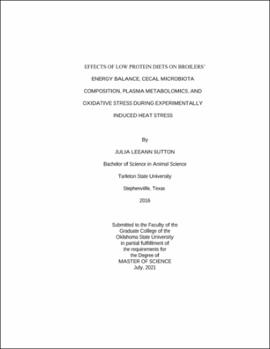| dc.contributor.advisor | Pezeshki, Adel | |
| dc.contributor.author | Sutton, Julia LeeAnn | |
| dc.date.accessioned | 2022-01-09T19:37:54Z | |
| dc.date.available | 2022-01-09T19:37:54Z | |
| dc.date.issued | 2021-07 | |
| dc.identifier.uri | https://hdl.handle.net/11244/333648 | |
| dc.description.abstract | Heat stress is a pressing challenge for livestock production. In 2013, the poultry industry alone lost $125-165 million due to heat stress-related death. The objective of Study 1 was to assess the effects of low protein diets (LP) on feed intake, heat production and markers of feed intake and thermogenesis regulation in the gut and muscle in broilers under experimentally induced heat stress (HS). 200-day-old male broiler chicks were weight-matched and assigned into 36 pens with 5-6 chicks/pen followed by randomly subjecting pens into two treatments (18 pens/treatment) including: 1) thermoneutral (TN), 2) HS (35 degrees C for 7 hours/day). Within each treatment, the pens were randomized to receive two diets (9 pens/diet; 50 birds/diet): 1) normal protein (NP), 2) LP. The study lasted 6 weeks with 2 weeks of adaptation (starter phase) and 4 weeks of data collection (grower and finisher phases). Feed intake and body weight were measured daily and weekly, respectively. On week 6 birds were euthanized and blood, duodenum, ileum, cecal contents and leg muscle samples were collected. A subgroup of birds was euthanized for assessing the breast meat quality and body composition using a dual-energy X-ray absorptiometry. All data were analyzed with either general linear model or mixed procedure (SPSS). Means within each treatment between NP and LP diets were separated by Student's t-test. The results of Study 1 provide evidence that LP diets mitigate the negative outcome of heat stress by reducing feed intake and heat production, which are regulated through factors expressed in the gut and skeletal muscle. Little is known whether the beneficial effects of LP diets on heat stress is associated with alterations in oxidative stress, plasma metabolomics and cecal microbiota. The objective of Study 2 was to investigate the effects of LP diets on broilers oxidative stress, plasma metabolomics and cecal microbiota composition during experimentally induced HS. The experimental design was the same as Study 1. The results of Study 2 showed that dietary protein content influenced the plasma metabolites with similar pattern during TN and HS, but that had differential effects on cecal microbiota composition under TN and HS. | |
| dc.format | application/pdf | |
| dc.language | en_US | |
| dc.rights | Copyright is held by the author who has granted the Oklahoma State University Library the non-exclusive right to share this material in its institutional repository. Contact Digital Library Services at lib-dls@okstate.edu or 405-744-9161 for the permission policy on the use, reproduction or distribution of this material. | |
| dc.title | Effects of low protein diets on broilers' energy balance, cecal microbiota composition, plasma metabolomics, and oxidative stress during experimentally induced heat stress | |
| dc.contributor.committeeMember | Foote, Andrew | |
| dc.contributor.committeeMember | Salak-Johnson, Janeen | |
| osu.filename | Sutton_okstate_0664M_17240.pdf | |
| osu.accesstype | Open Access | |
| dc.type.genre | Thesis | |
| dc.type.material | Text | |
| dc.subject.keywords | broiler chickens | |
| dc.subject.keywords | cecal microbiota | |
| dc.subject.keywords | growth performance | |
| dc.subject.keywords | heat stress | |
| dc.subject.keywords | low protein | |
| dc.subject.keywords | plasma metabolomics | |
| thesis.degree.discipline | Animal Science | |
| thesis.degree.grantor | Oklahoma State University | |
